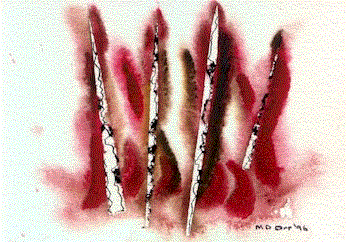Papa


I was hunting colored treasure
Buried in the Southern, springtime grass,
Delighted to run among the giant oaks and pines,
To race the hundred other children
Celebrating Easter time.
It was warm, a light breeze blew,
The dogwoods scattered white
Below the overarching oaks.
The pink azaleas stood in fluttering banks
Around the trees.
Through rustling leaves,I heard two children whisper,
"Don't tell him, but Mr. Kramer's dead."
I felt the sobbing start,
And then I fled the park
Across the asphalt street
To where my parents
And my old beloved grandpa lived.
Mother met me at the stoop.
In tears, I asked her was it true,
And she said, "Yes, it is. Your Papa's dead."
I'd known two days that
Death was near.
My Dad, a rawboned, giant man,
Had carried Papa from his bed.
I met them in the hall
My Papa said to Dad, "I'm scared."
My Dad beheld the cancer-bloated body
He had every day to drain
Of fluids with a large syringe,
Else Papa would explode,
And said. "I know."
Sometimes a person's death is beautiful
Following after suffering,
Like some exhaling of the pain
Out to earthen air.
Papa fled this earth into the light,
Leaving only memories of his love.
They called him Mr. Kramer
Where he worked.
Everybody knew the man,
From mayor to hardened criminal.
He was the City Jailor
Over fifty years.
"Mr. Kramer's Hotel", they called the jail.
He was a harsh, but fair, proprietor of it.
He served his time without vacation,
Without a day of leave from work
To hunt the white-tailed deer
Or lie about the fish he caught.
He didn't lie at all.
His life was bare-boned truth,
Like raw, unvarnished pinewood board.
(This was before psychology
When a man was what he did,)
This man did many things:
He kept a small menagerie
Behind the jail.
There was big brown bear,
Child of his heart,
And scores of poisonous snakes
He kept in a pit.
One day he put a King snake in
And, over a year or two,
The poisonous ones declined in numbers
Until there was only one fat King.
Papa's baboon liked my uncle Reggie,
Didn't like my mother Dot.
Dot and Reggie fought
The sibling fight a lot,
So, one day by the cage,
The baboon took my uncle's side,
Grabbed my mom
And pulled out half her hair.
Later, when she dated Dad,
They'd sit out on the porch to neck.
One of the gaudy parrots
From the little zoo
Screeched, "Papa, Papa,"
Every time they kissed.
Papa didn't have to come
To spoil the lover's play.
The parrot was enough.
To ruin their day.
Papa did lots of ruining.
His job was retribution
For the state.
He did it well.
Murderers and thieves
Were his unwelcome guests,
And blacks who didn't "know their place"
Found one in his.
"Hard but fair" was what
They said of him,
Both black and white,
But he could ruin a life
With fists and billy club.
Justice was a rigid thing—
You did a crime, and you got caught,
You went to jail and suffered.
That was it!
No one thought it harsh,
No one in jail felt victimized.
No one cared why
The crime was done—
The doing said it all.
This was a man's world still.
The Man was known as Papa
To his children,
And Mr. Kramer to all the rest.
He was American Justice in the flesh.
Papa carried habit to extreme.
Routine was his religion.
He served this god both day and night.
He had little table,
Halfway in the kitchen,
Halfway in the dining room
Where all his family sat.
Mama always made his food
Before the rest and let it sit
Until it was stone cold—
He wouldn't eat it hot.
His knife and fork
Had carved bone grips,
His plate was metal,
Divided like a child's
In sections for the different
Kinds of food.
Like a child,
He didn't like his flavors mixed.
At work he walked his rounds each day—
Same time, same route,
Always the same way home.
One day a Negro inmate
In a cell feigned sick
While Papa made his rounds.
Papa checked the man,
Who swung at my grandpa
With razor blade.
I think he meant to cut his neck,
But hit his badge instead.
This was his big mistake.
Papa was the Law,
And Mighty Law reigned fist
And billy club on him
'Til he lay bleeding, near to death.
Papa left his cell
And started down the way
His routine ran—
Same time, same route,
As always, the same way home—
Forgot about the bleeding man
Until his nightly coffee, always black,
Steamed on the little table at his home
And called the memory back.
In rising steam he saw the man,
Then summoned him an ambulance.
I still have the badge.
It has a vicious scratch
Across its face.
The man had tried to kill
The man I loved,
And elemental justice paid him back—
A man was what he did.
Every white man was racist then.
This was the South
And people still remembered when
The cotton grew,
The white man was still king,
And slaves did all the work.
Of course the memory was a lie.
A guy like Papa or my old man
Were called "white trash"
By folks who owned plantations.
They watched magnolias bloom
And sipped mint juleps
While folks like mine
Brought mules up from the barn
And milked the cows,
Or made, with toughened hands, their shoes.
Folks like mine had no one to look down upon
Except the blacks. (We all look down!)
Black was the rage inside my folks,
Black rage, terror, darkened hopes.
They looked inside
And saw themselves enslaved
With blackened souls
And little hope,
And hated that,
And hated those who bore the blackened skin.
Papa was a member of the Southern, Celtic tribe,
He was its Law,
So crushed the hated, scapegoat black—
A man was what he did.
Religion was something
Papa never cared for in his youth.
He never went to church
With all the women folk.
He believed in God all right,
The thundering one
On Sinai's heights,
Who punished all the sins of men.
Papa was like the Old Book's pages written in the flesh,
The wrath of God
To any man who dared transgress,
And Papa executed every law.
The womenfolk
Might know the God
With healing in his wings,
But Papa made the wounds—
A man was what he did.
Somewhere inside the rock
That was his heart,
A tiny spot of fertile soil
Was hidden in a cleft,
And in that spot a tiny
Bit of green had grown
All of his life.
Its holy tendrils worked
Among the cracks
And slowly undermined
His hardened core.
Then Mama died
When I was three.
The rock that was his heart
Began to break,
The greening plant
Began to grow,
As if it found its native soil.
Unannounced, one day
He went to church
And saw the God with tender eyes.
And saw She is a gardener.
He noticed that a little flower had grown
Within his yard—He noticed me,
And took me on his knee.
This was a most almighty
Place for me.
Its power lasts today
When I am past the mid-day
Of my life.
God had put a tiny seed
Deep in my heart too,
And Papa was the first to water it,
The very first to love.
He had a rocking chair.
It had blue cushions.
Its arms were carved
To look like necks of geese.
He entertained me there.
On his knee I sat and felt
The rough wool texture
Of his uniform,
Fiddled with his badge,
And with the patch
That covered up a missing eye.
Papa's smile was what I sought,
Plus, stories he told
Of bears and ponies.
He was my truly gentle friend.
His little dog named Mitzi
Shared his lap—His love could hold us both.
We were both wigglers,
Only I could talk,
But Mitzi had a language of her own.
He took the dog for walks with him.
After they retired him from the force,
let him keep his uniform,
And he, unpaid, patrolled
The park by us
To keep the black folks out—
All white men were racist then.
Papa settled in a rhythm of days—
The rounds he made,
The dinners at his separate place,
His metal plate
With knife and fork of bone,
His Sunday walk to church,
His daily talks with me,
Until his time ran out,
And sickness broke
The routine of his days.
"Don't tell him, but Mr. Kramer's dead,"
The children said.
I still recall the sadness of that day.
A man was what he did,
And he loved me.
A man is who he loves,
I love him still.






